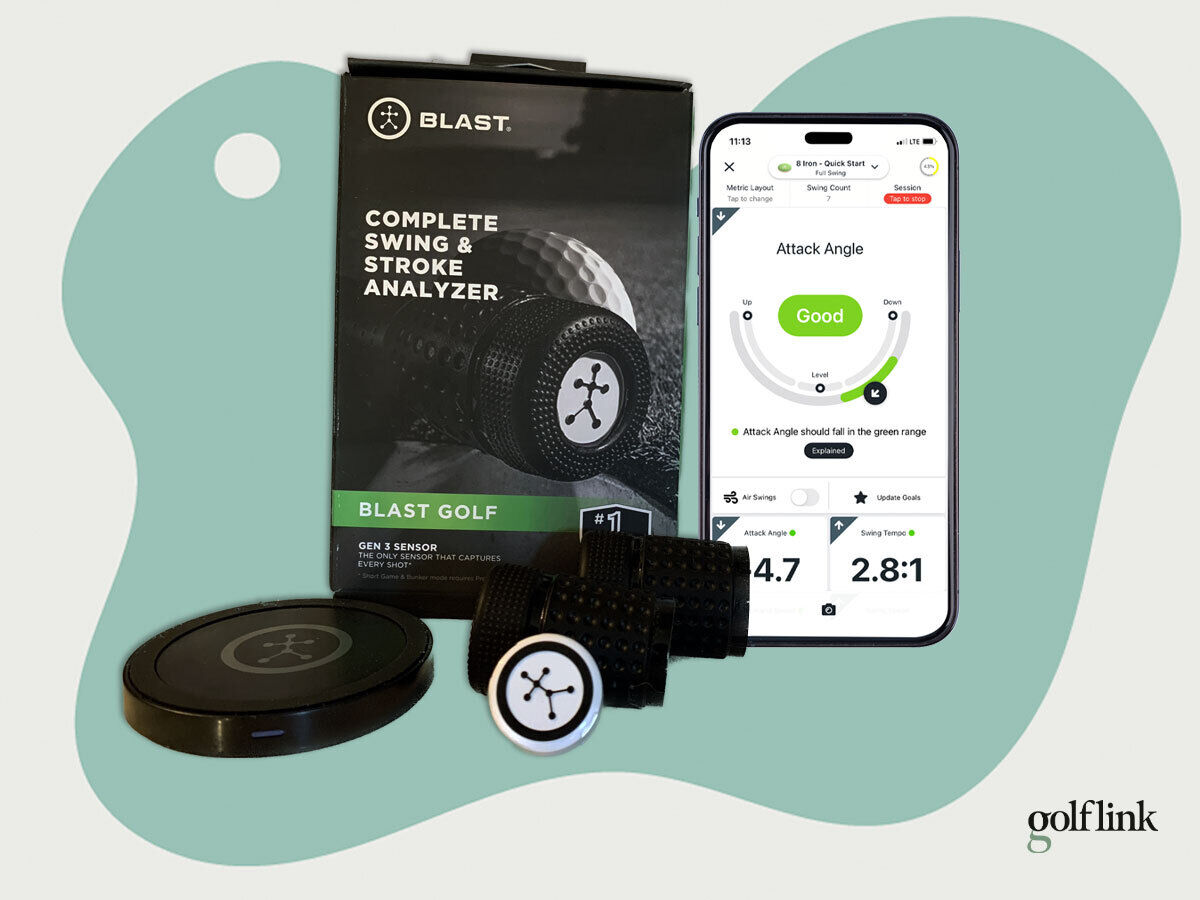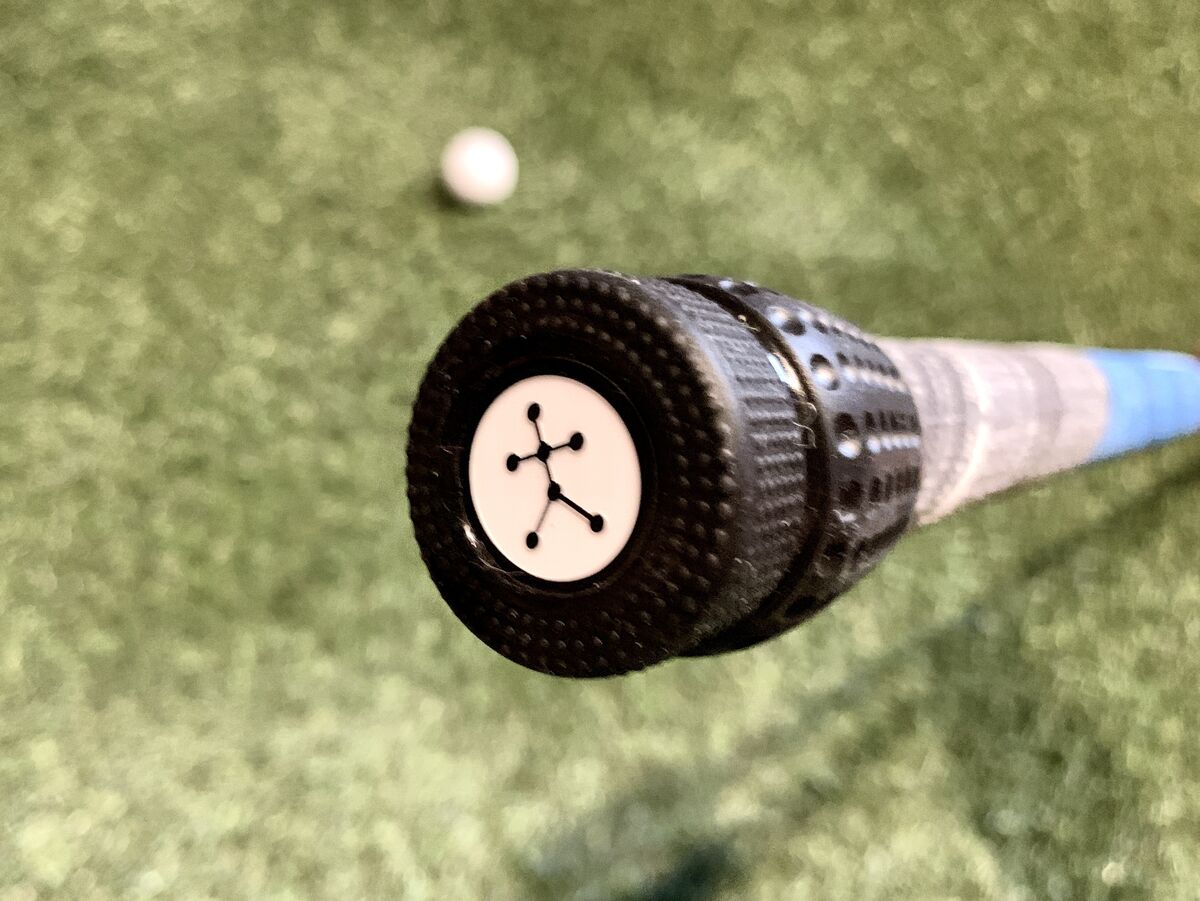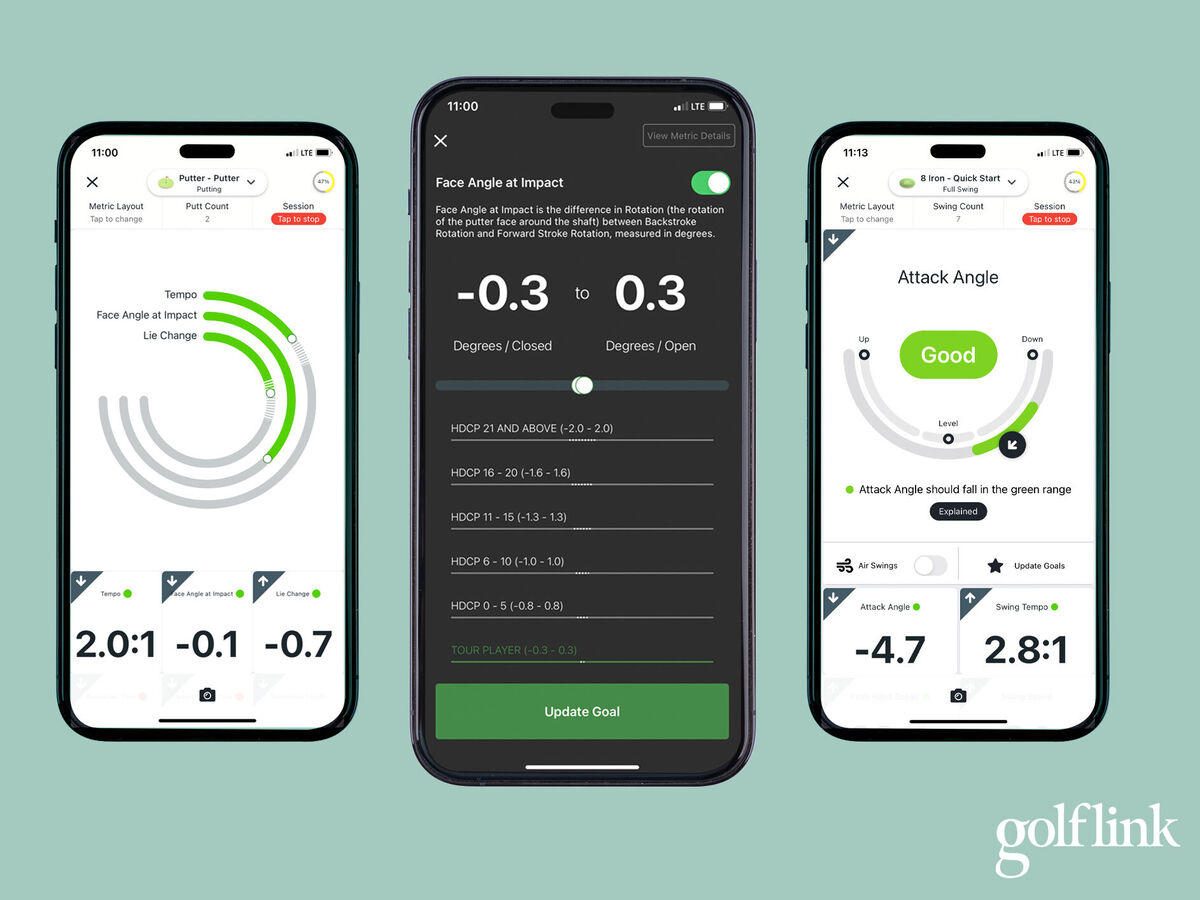Blast Golf Review: 3 Takeaways From the Swing Analyzer

After a few weeks of practicing with Blast Golf, we’ve come to three overarching conclusions. First, it’s addicting. Second, Blast unapologetically highlights your weaknesses. Finally, practicing with Blast gives you a whole lot of feedback that is otherwise inaccessible.
Blast Golf: The Nuts & Bolts
Blast Golf: $179 | CHECK BLAST GOLF | CHECK AMAZON
Blast Golf is a sensor that fits into a rubber sleeve, that then fits on the butt of your club, including oversized putter grips. From there, it pairs with the Blast Golf app to track in-depth data from every swing you make.
The app lets you know – in no uncertain terms – what parts of your swing or putting stroke are great, and which parts need work. It also gives you some tips and drills to improve those weaknesses.
As with any golf product, there are some downsides you should consider before committing to Blast. Don’t worry, we’ll go over the finer details of using Blast Golf a little later, but for now, let’s jump right into our biggest takeaways.
Practicing With Blast Golf is Addicting

Blast golf sensor attached to a grip
With Blast Golf you can easily choose which metrics to focus on during a particular practice session.
For example, I wanted to work on delivering my putter face as square as possible at impact. I set my goal between 0.3 and -0.3 degrees, told the app to show me Face Angle at Impact, Tempo and Lie Change, and started hitting putts. After every stroke, Blast gave me color-coded feedback on how my stroke compared to the goals I set within the app in each of those categories.
Seeing your stroke pop up with satisfying green accents – which means you’ve hit your goals – is addicting. For me, this made putting practice electrifying, an area that had always been a choir, and one that was often ignored.
The cravings extended beyond putting. With the full swing, I improved my tempo drastically almost immediately. When I first plugged Blast Golf into an iron and took full swings, my tempo was around 2.1:1. If you know anything about swing tempo, you know a ratio of 3.0:1 (a backswing that’s three times longer than your downswing) is ideal.
I set my goal tempo between 2.5:1 and 3.1:1, and began training. Before long, I learned the feeling of an improved tempo, and even when I shifted my focus to other areas, like attack angle, I maintained my improved tempo.
Blast Highlights Your Weaknesses
There’s no hiding from the problem areas of your swing when you practice with Blast. But then again, why would you want to? The whole point of practicing with Blast Golf is to identify and improve your weaknesses.
Whatever your flaws are, Blast will bring them to the surface. It’s up to you to prioritize what you want to work on, and how to do it. There are training videos and drills in the Blast Golf app that address many of the flaws that Blast identifies. Those videos can be a good jumping off point, but for me, they left a healthy amount to be desired. That’s alright, simply being aware of what’s happening in my swing and focusing on one thing at a time was enough to help me improve.
Blast Golf Captures Data That’s Otherwise Inaccessible

Screenshots of the Blast Golf app
It’s not that you can’t measure your tempo or face angle anywhere else, but Blast Golf makes so many insights into your golf swing accessible, and puts them in one place. Not only that, but Blast gives you target ranges for each metric (when applicable) for various handicap ranges. If you want to improve, set your goal to the target range for your goal handicap range.
For example, Blast has changed my short game practice. With Blast, my goal is to produce a consistent tempo and attack angle with various swing speeds, which correspond to different distances. This gives me confidence on the course that I can produce a chip or pitch shot of any distance I need.
From my experience practicing with Blast Golf, I found these to be the 10 most useful insights into my swing:
|
Metric |
Swing Type |
|
Tempo |
All |
|
Backswing Time |
All |
|
Downswing Time |
All |
|
Face Angle at Impact |
Putting |
|
Loft Change |
Putting |
|
Lie Change |
Putting |
|
Impact Stroke Speed |
Putting |
|
Attack Angle |
Full Swing |
|
Peak Hand Speed/Downswing Time |
Full Swing |
|
Swing Speed |
Short Game/Full Swing |
Inside Blast Golf
The Blast Golf package comes with one sensor, a charger and two sleeves that fit over the butt of your clubs. One sleeve fits over standard grips, and a larger sleeve is included to fit on top of oversized putting grips. Charge the sensor to full before you start practicing. Once it’s charged, the battery life is strong enough to get you through six to eight hours of practice, or a week in standby mode.
Once you download the Blast Golf app, pairing it with your sensor is pretty seamless. From there, however, I ran into some trouble getting started tracking strokes with the sensor. Since I've ironed those out, it's been smooth sailing.
Blast Golf Pros & Cons
We’ve already gone over some of these benefits of Blast Golf.
Pros:
- It makes practice more fun
- Access to data that you would struggle to collect elsewhere
- Information you can easily use to improve your golf swing mechanics and consistency
- Prescribed benchmarks in every applicable metric depending on your skill level
On the other hand, I ran into some drawbacks with Blast Golf. I’ll share some solutions to these issues next.
Cons:
- Difficulty getting the sensor to track shots initially
- Inconsistency in collecting swing data
- Drills and training videos could be more helpful
- No Face Angle at Impact on full swings
Blast Golf Tips
Through trial and error, I’ve learned a few tips and tricks that alleviate some of the frustration that can come with using Blast. Here are two quick Blast Golf tips I wish I had when I first started using it:
- Align the sensor on your club so the logo is facing up
- Don’t use the larger sleeve on standard-sized grips
I mentioned that initially, I had trouble getting the sensor to record shots. The Blast instructions say just stick the sensor on your club, and go. I started with it on my putter, but no matter what I did, it wouldn’t record my stroke.
Finally, I realized that the sensor had to be aligned in a specific orientation, with the logo facing up. Once I made that adjustment, it worked great.
As I transitioned into full swings, Blast began missing quite a few swings. Despite ensuring that the sensor was flush with my grip, it would still miss more swings than I liked. I use mid-sized grips on most of my clubs, and a few extra wraps of tape under my standard-sized grips, so I kept the Blast Golf sensor in the larger sleeve. That, however, was a mistake. Once I swapped the sensor into the smaller sleeve, and squeezed it over my grips (it was a tight fit), it picked up data on almost every full swing.
Perfect Practice Makes Perfect
We’ve all heard the saying practice makes perfect. I prefer the adaptation perfect practice makes perfect. Golf is a shining example that simply practicing doesn’t always help you improve. You must practice the right fundamentals and techniques to actually get better.
Practicing with Blast Golf doesn’t mean your practice sessions will be perfect or your swing will be perfect, but it trains you to improve some of the most important fundamentals that undeniably lead to better, more consistent golf.
If you want to get more out of your practice sessions and you’re interested in some of the fine details about what happens during your swing, I think you’ll be hooked on Blast Golf.